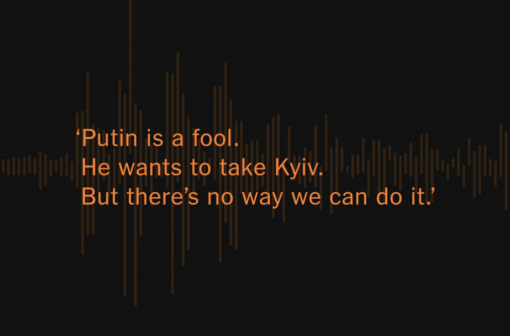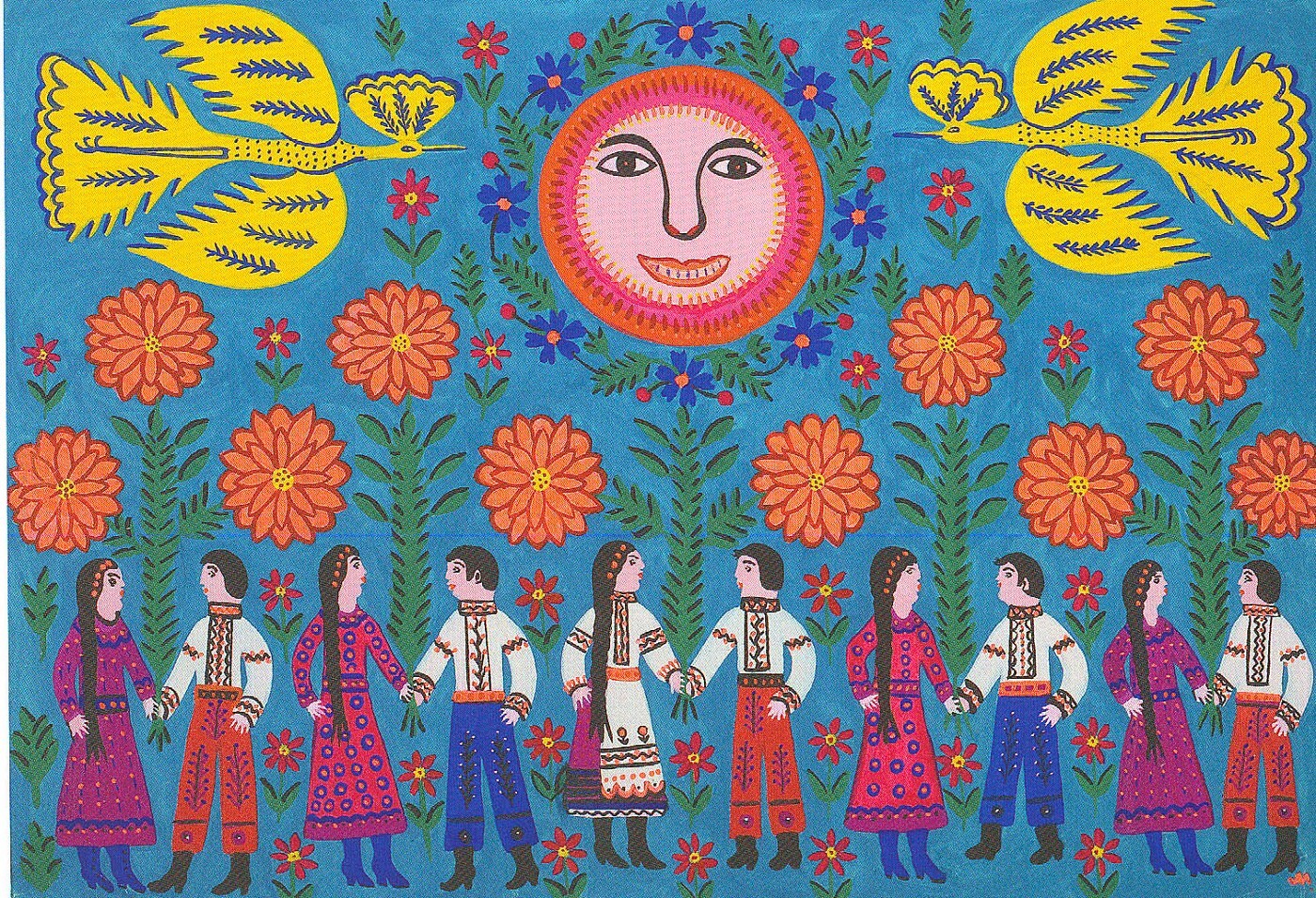Critical media theorist Svitlana Matviyenko’s recent Marshall McLuhan Lecture, delivered at Berlin’s Transmediale conference, has now been turned into an online article in E-Flux. Titled “Speeds and Vectors of Energy Terrorism,” the article provides both a deeply personal perspective (from one who has been in Ukraine during much of Russia’s full-scale invasion) and a rigorously theorized one covering the continuities and discontinuities between the Russian-Ukrainian war and previous wars going back to world wars one and two.
As has been the case with her “Dispatches from the Place of Imminence” (written for the Institute of Network Cultures), and familiar to previous readers of her writing, Matviyenko focuses especially on the more innovative fronts of this particular war, including cyberwar and disinformation; the role of nuclear power plants, including the occupation of the Chernobyl and Zaporizhzhia complexes; the “irreversible militarization of life” with its “epidemic” proliferation of “martial assemblages”; the mythical nature of the concept of “victory”; and the production of “terror environments” centering around “necropolitical data-subjects.” Regarding the latter, Matviyenko notes how the Russian government’s justification for the full-scale invasion, and its refusal to call it a “war,” fully marks it as a “state of exception”:
In this regard, the Russian state’s description of its war as a “special operation” is accurate: it declares its intention to transgress the laws of war by opening space for unregulated war crimes, for creating multiple terror environments marked by extreme suppression and violence.
Her reference to the “necropolitical ‘death-worlds'” produced by the use of pollution as a weapon of war — a form of “vertical occupation” that is different from the “horizontal occupation” of territory — is especially sobering:
In war, however, pollution spreads—and violence occurs—at various speeds. In addition to the fast, or extremely fast, violence of rocket strikes, bombs, and other explosions that also release toxic chemicals, other forms of pollution spread “gradually and out of sight,” whether as a consequence of these faster forms, or independently. [. . .] This war will stay with us as a sequence of heavy losses for the entire earthly community.
This is a topic I intend to come back to in future posts. But I want to focus a little more here on a line of thinking connected to the colonial/decolonial question.
Matviyenko identifies two “vectors” of the “ongoing, complex, asymmetrical warfare.” The first is “interimperial,” and it “unfolds according to the logic of deterrence.” While this vector “is extremely aggressive,” it is a “communicative exchange” that largely follows the transactional pursuit of national interests. In this case, Russia’s “extreme extractivism and exploitation” has served “the fossil-fuelled capitalist interests of the so-called West and its simultaneously ‘oil-soaked and coal-dusted’ democracy,” as Cara Daggett has called it. Alongside the global South’s similar reliance on Russian fossil fuels (which Matviyenko doesn’t get into, but in which India is a key actor), this means that “the list of countries that retain economic relations with Russia after a year of genocidal war remains long” and that “fossil-fuel fascism” is sustained, not fundamentally challenged.
The second vector Matviyenko identifies is “colonial-imperial,” which follows “a trajectory of noncommunication.” This is a vector that “sets the direction for relations of suppression, subsumption, annihilation, and erasure,” such that “[a]ll negotiations are suspended indefinitely”: “‘Ukraine does not exist’ for the Russian state as a party in negotiations, except as an imagined subaltern who must submit to the invader’s will.” Matviyenko continues:
The Russian Federation claimed that they “had no choice” but to invade Ukraine and kill its people, which constitutes a complex and contradictory epistemological landscape that could probably only be deciphered through psychoanalysis. This urge, ever embittered by an extreme resentment that will only grow in the future, is particularly strong in those citizens of the Russian Federation who already feel—or will feel very soon—that whatever future they thought they had in Russia has been stolen from them. This mass vision of a stolen future will remain one of the many dangerous consequences of this war, no matter what awaits the Russian Federation in the years to come. It will also serve as a resource for future fascist mobilizations.
This same noncommunication sustains colonial relations between the Russian state and underdeveloped communities in its jurisdiction. This noncommunication also extends to peoples who self-identify as Indigenous, but remain unrecognized. Russian legislation only acknowledges forty-seven peoples across the vast landmass. According to the International Work Group for Indigenous Affairs, after the annexation of Crimea the list of unrecognized but self-identified Indigenous peoples grew to include the Crimean Tatars, the Krymchaks, and the Karaim. The empire only acknowledges the existence of a form of life when it is deemed useful, when the empire sees its potential for resourcification.
The coloniality of the latter is especially evident in Russia’s “reliance on an unrestricted supply of cheap, disposable human resources drawn from colonized first-nation communities and many strategically underdeveloped ethnic and social groups within the Russian Federation.”
It’s worth pointing out here that there are multiple imperial-colonial vectors at play in today’s situation. In a recent piece in New Eastern Europe, Milosz Cordes notes this colonial disparity writ large across Russia — where “[r]evenues from oil and gas from the non-ethnic Russian Nenets, Yamalo-Nenets and Khanty-Mansi Autonomous Okrugs [provinces] fuel investments in Moscow and St. Petersburg, and prevent regions like Novgorod, Bryansk or Pskov from economic collapse. This is a typical model of economic exploitation,” he writes, “known from the Congo, Egypt or Latin America,” which qualifies the Russian regions east of the Urals as “part of the Global South.”
This “colonial-imperial vector” works differently in relation to the Buryats, Dagestanis, Tatars, or South Ossetians who have been among the primary “cannon fodder” for the Russian military, than to Ukraine or Belarus, the “brotherly peoples” of the “Great Russian race.” In imperial thinking, the latter have been more valued as the “backbone” of Great Russia, but are (as is clear today) also to be punished more vehemently when they reject their fate as “inner colonies.”
Ukraine’s long dance in relation to Russia and away from it has been going on for over a century and a half (and in some places since the 17th century state-building of Bohdan Khmelnytsky), with even leaders of Ukraine’s first independence movement — among them Mykhailo Hrushevsky, pivotal historian and first president of the Central Council of the 1917-20 Ukrainian People’s Republic — uncertain of whether Ukraine’s future lay with Russia or apart from it. If Stalin could destroy an entire generation to crush Ukraine’s independentist aspirations, however, Putin cannot. And so today we find Ukrainians in their culminating national-liberationist moment.
What this means for Ukraine is pretty clear: political self-determination accompanied by some measure of civic and cultural revitalization (the details of which have become clearer over time, but which still remain to be determined in post-war Ukraine). What it may mean for Russia — especially as Russia risks imploding from the neo-imperialist overextension of its capacities, and as calls for Russia to decolonize increase — is something I will explore in upcoming posts.
Please stay tuned for more on this topic.



